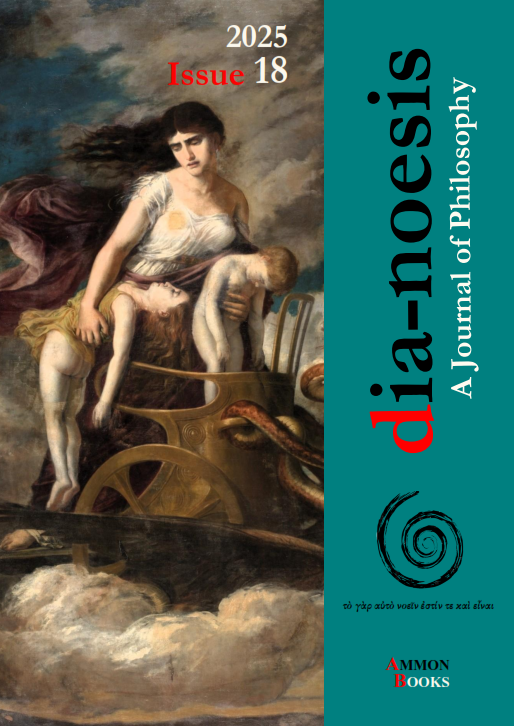Bioethics in a skeptical perspective: how to not always treat trauma during exile and cultural displacement

Published:
Nov 23, 2025
Keywords:
Bioethics trauma exile cultural displacement Skepticism
Abstract
In today’s world, bioethics seems to be the best solution we have in order to sustain a firm and efficient ethical understanding of our suffering world. However, in its good-willed narrative a lot is missing. Many of our fellow human beings carry another cultural and historical awareness than our own. In the context of interaction between the authority of the bioethicist and the needful person of exile or cultural displacement, trauma may indeed not get cured, or even worse, become deeper. As communication between distinct identities is indispensable, both doctor and patient need to re-identify themselves, often securing for each other a certain suspension of knowledge and moral decision.
Article Details
- How to Cite
-
Eliopoulos, P. (2025). Bioethics in a skeptical perspective: : how to not always treat trauma during exile and cultural displacement . Dia-Noesis: A Journal of Philosophy, 18(2), 187–208. https://doi.org/10.12681/dia.43453
- Section
- Articles
Downloads
Download data is not yet available.
References
Andorno, R., and G. Boutlas. “Global Bioethics in the Post-Coronavirus Era: A Discussion with Roberto Andorno”, Conatus - Journal of Philosophy, 7: 1, 2022, pp. 185-00, https://doi.org/10.12681/cjp.27999.
Agich G. J., “The Question of Method in Ethics Consultation”, American Jour-nal of Bioethics, 1:4, 2001, pp. 31–41.
Bauer J. E., “’Mein Feld ist die Welt’: On Magnus Hirschfeld’s Conception of Exilic Nomadism and the Origins of Sexual Ethnology”, Dia-noesis, 8, 2020, pp. 7-48.
Bett R., Sextus Empiricus: Against the Ethicists. Oxford 1997: Clarendon Press.
Churchill L. R., “Are We Professionals? A Critical Look at the Social Role of Bioethicists”, Daedalus, 128: 4, 1999, pp. 253- 274.
Cuerda E., “Medicine and State Violence”, Conatus, 4: 2, 2019, pp. 245-262.
Dancy J., Ethics Without Principles. Oxford 2004: Clarendon Press.
De Gracia D., Human Identity and Bioethics. Cambridge 2005: Cambridge Uni-versity Press.
De Zulueta P. C., “Suffering, Compassion and ‘Doing Good Medical Eth-ics’”, Journal of Medical Ethics, 41: 1, 2015, pp. 87–90.
Doris J. M., “Skepticism about Persons”, Philosophical Issues, 19, 2009, pp. 57-91.
Dragona-Monachou M., Syghroni Ithiki Philosophia (Contemporary Moral Phi-losophy). Athens 1995: Ellinika Grammata.
Downie R. S., Macnaughton J., Bioethics and the Humanities. Attitudes and Perceptions. New York 2007: Routledge.
Elliott C., “The tyranny of expertise”, in Eckenwiler L. A., Cohn F. G. (Eds), The Ethics of Bioethics. Mapping the Moral Landscape. The Johns Hopkins University Press, Baltimore 2007, pp. 43-46.
Engelhardt H. T., “The search for a global morality: Bioethics, the culture wars and moral diversity”, in Engelhardt H. T. (Ed), Global Bioethics. The Col-lapse of Consensus, M & M Scrivener Press, Salem 2006, pp. 18-49.
Gabrielyan O., Suleimenov I., “Objective Foundations of Ethics and Prospects for Its Development: Information and Communication Approach”, Conatus, 10:1 2025, pp. 111-125.
Hare R. M., Essays on Bioethics. Oxford 1993: Oxford Academic.
Hua P., Fenton S. J., Freestone M., Bhui K., Shakoor S., “Ethnic disparities as potential indicators of institutional racism in inpatient care within acute mental health wards: A rapid review, SSM- Mental Health, 8, 2025 https://www.sciencedirect.com/journal/ssm-mental-health/vol/8/suppl/C
Jotkowitz A., “Ethics Consultation: Whose Ethics?”, American Journal of Bio-ethics, 7:2, 2007, pp. 41-42.
Kiritsis D., “Economic Globalization, Society and Education”, Dia-noesis, 10, 2021, pp. 87-100.
Morris D., “Narrative, Ethics and Pain: Thinking with Stories”, in Charon R., Montello M. (Eds), The Role of Narrative in Medical Ethics. Routledge, New York 2002, pp. 196-213.
Mude W., Whitehorne-Smith P., Nyanhanda T., Mwanri L., “The Perceived So-cial Determinants of Mental Health among African Youth Refugees in South Australia”, Journal of Immigrant and Minority Health, 27, 2025, pp. 743–750.
Regel E., “Mental health and humanitarian crisis: Moral stress in trauma thera-py”, Bioethics, 38, 2024, pp. 811–815.
Saunt C., Unworthy republic: the dispossession of Native Americans and the road to Indian territory. New York 2020: W. W. Norton & Company.
Sermetis T., “Freedom of Consciousness in Sartre”, Dia-noesis, 11, 2021, pp. 117-128.
Toulmin S., 1981, “The Tyranny of Principles”, The Hastings Center Report, 11: 6, 1981, pp. 31–39.
Smedley B.D., Stith A.Y., Nelson A.R., “The culture of medicine and racial, ethnic and class disparities in health care”, Unequal Treatment: Confronting Racial and Ethnic Disparities in Health Care. National Academies Press (US), 2003.
Vasanthakumar A., The Ethics of Exile: A Political Theory of Diaspora. Oxford 2021: Oxford University Press.
Veatch R., A theory of medical ethics. New York 1981: Basic Books.
Zeleke W. A., Wondie Y., Mekonen M. M., Hailu T., Holmes C., Moges M. D., Nenoko G., “The collective narrative of trauma and healing among internally displaced individuals in Ethiopia: a community-based participatory action research inquiry”, BMC Psychiatry, 25:705, 2025 https://doi.org/10.1186/s12888-025-07043-4


